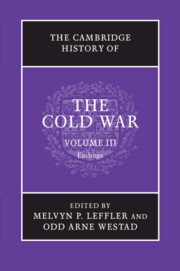Book contents
- Frontmatter
- 1 The Cold War and the intellectual history of the late twentieth century
- 2 The world economy and the Cold War, 1970–1990
- 3 The rise and fall of Eurocommunism
- 4 The Cold War and Jimmy Carter
- 5 Soviet foreign policy from détente to Gorbachev, 1975–1985
- 6 Islamism, the Iranian revolution, and the Soviet invasion of Afghanistan
- 7 The collapse of superpower détente, 1975–1980
- 8 Japan and the Cold War, 1960–1991
- 9 China and the Cold War after Mao
- 10 The Cold War in Central America, 1975–1991
- 11 The Cold War and southern Africa, 1976–1990
- 12 The Gorbachev revolution and the end of the Cold War
- 13 US foreign policy under Reagan and Bush
- 14 Western Europe and the end of the Cold War, 1979–1989
- 15 The East European revolutions of 1989
- 16 The unification of Germany, 1985–1991
- 17 The collapse of the Soviet Union, 1990–1991
- 18 Science, technology, and the Cold War
- 19 Transnational organizations and the Cold War
- 20 The biosphere and the Cold War
- 21 The Cold War and human rights
- 22 The Cold War in the longue durée: global migration, public health, and population control
- 23 Consumer capitalism and the end of the Cold War
- 24 An ‘incredibly swift transition’: reflections on the end of the Cold War
- 25 The restructuring of the international system after the Cold War
- Bibliographical essay
- Index
- References
3 - The rise and fall of Eurocommunism
Published online by Cambridge University Press: 28 September 2010
- Frontmatter
- 1 The Cold War and the intellectual history of the late twentieth century
- 2 The world economy and the Cold War, 1970–1990
- 3 The rise and fall of Eurocommunism
- 4 The Cold War and Jimmy Carter
- 5 Soviet foreign policy from détente to Gorbachev, 1975–1985
- 6 Islamism, the Iranian revolution, and the Soviet invasion of Afghanistan
- 7 The collapse of superpower détente, 1975–1980
- 8 Japan and the Cold War, 1960–1991
- 9 China and the Cold War after Mao
- 10 The Cold War in Central America, 1975–1991
- 11 The Cold War and southern Africa, 1976–1990
- 12 The Gorbachev revolution and the end of the Cold War
- 13 US foreign policy under Reagan and Bush
- 14 Western Europe and the end of the Cold War, 1979–1989
- 15 The East European revolutions of 1989
- 16 The unification of Germany, 1985–1991
- 17 The collapse of the Soviet Union, 1990–1991
- 18 Science, technology, and the Cold War
- 19 Transnational organizations and the Cold War
- 20 The biosphere and the Cold War
- 21 The Cold War and human rights
- 22 The Cold War in the longue durée: global migration, public health, and population control
- 23 Consumer capitalism and the end of the Cold War
- 24 An ‘incredibly swift transition’: reflections on the end of the Cold War
- 25 The restructuring of the international system after the Cold War
- Bibliographical essay
- Index
- References
Summary
After the Soviet invasion of Czechoslovakia in August 1968, the leading West European Communist Parties – the Italian and the French – expressed their disapproval of the repression of the Prague Spring and of its ideological justification, known as the Brezhnev Doctrine. Such dissent marked a historic turn of events, given that both parties had unconditionally approved the Soviet invasion of Hungary in 1956. For a brief moment, the creation of a Western Communist pole was conceived of as a possibility in Italy and France, and perceived as a danger in Moscow. However, in a few months, the scenario of a coup de théâtre – a new heresy in the Communist world – came undone. Under pressure from the USSR, Western Communism’s united front fell apart. The French Communists (Parti communiste français, or PCF) backtracked, happily accepting the authoritarian “normalization” in Czechoslovakia. The Italian Communists (Partito comunista italiano, or PCI), on the other hand, maintained their dissent, but were careful not to break with the Soviets, retaining the idea of “unity in diversity” inherited from Palmiro Togliatti, the leader of the PCI from 1927 to 1964.
Nevertheless, such a prospect was kept alive by the Italian Communists, the most important Communist force in the West. They obstinately refused to brush the Prague Spring aside as a negligible episode and gradually increased their electoral strength in the country. During the early 1970s, the PCI under Enrico Berlinguer’s leadership developed into a party that promoted an Italian road to socialism within the framework of a parliamentary democracy.
- Type
- Chapter
- Information
- The Cambridge History of the Cold War , pp. 45 - 65Publisher: Cambridge University PressPrint publication year: 2010
References
- 18
- Cited by

